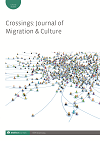-
f Fluid identities and navigating integration: The politics of solidarity in contemporary Germany
- Source: Crossings: Journal of Migration & Culture, Volume 9, Issue 1, Apr 2018, p. 45 - 59
-
- 01 Apr 2018
Abstract
Due to political, economic and environmental factors, global immigration will only increase. Using Germany as a case study, the research question addressed in this article is not if the public thinks immigrants and asylum seekers should be permitted entrance to politically stable countries, but rather once they have arrived, what active strategies can be implemented to achieve healthy integration and who should set the agenda? A qualitative data analysis, culled from interviews conducted during the summer of 2016, contribute to the debate on public opinion around the politicization of immigration and identity. This analysis examines the media coverage of specific socially and politically charged events in relation to Germany’s solidarity movement, known as Willkommenkultur (welcome culture). The study found that the way in which a society defines, frames and understands the motivations behind its movements of opposition, or solidarity, potentially allows for a shift in perspective leading to a reimagining of what is and what could be.


